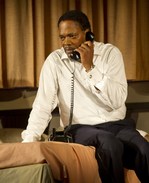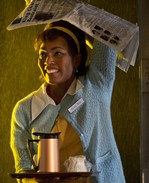SITE GUIDE
SEARCH
REVIEWS
REVIEW ARCHIVES
ADVERTISING AT CURTAINUP
FEATURES
NEWS
Etcetera and
Short Term Listings
LISTINGS
Broadway
Off-Broadway
NYC Restaurants
BOOKS and CDs
OTHER PLACES
Berkshires
London
California
New Jersey
DC
Philadelphia
Elsewhere
QUOTES
TKTS
PLAYWRIGHTS' ALBUMS
LETTERS TO EDITOR
FILM
LINKS
MISCELLANEOUS
Free Updates
Masthead
A CurtainUp Review
The Mountaintop
By Elyse Sommer
|
Civil right'll kill ya fo' them Pall Malls will — Camae. I like your sense of humor. Like mine. . .morbid— King This exchange is followed by a loud thunder clap that has King grabbing his chest and breathing hard and prompts Camae's Don't tell me a grown man like you 'fraid of lil' lightnin'? and King's prophetic No. that's not what I'm afraid of. |


Samuel L. Jackson and Angela Bassett
(Photo: Joan Marcus)
Katori Hall's The Moutaintop takes place during a rainy night on April 3, 1968 in Memphis's Lorraine Motel. The occupant of one of the bedrooms is Dr. Martin Luther King. That makes the ending a foregone conclusion. Whatever happens on David Gallo's faithful in the smallest detail replica of that motel bedroom now part of a civil rights museum, there's no question that King is going to be gunned down on the balcony the next day.
King's accomplishments have been extensively documented and honored, and reams have been written about his assassination as well as his personal weaknesses. That hasn't deterred Ms. Hall, a Memphis native, to once again turn back the clock, this time for an imaginary visit with the fallen civil rights leader.
Hall hasn't rewritten history and conjured up a way to let King live. Her inventiveness comes from her creating a fictional maid named Camae to bring a cup of coffee to King's room just after he's delivered his famous Mountaintop speech. The result is a play that doesn't quite live up to the expectations raised by its Olivier and Evening Standard Award award winning premiere run in London. It is, however, a gift for two actors, an imaginative if overly hokey faction that's punctuated with much humor and a surprise detour into something more ethereal at midpoint which in deference to the show's Broadway producers I'll refrain from detailing.
I'm not giving away anything about that surprise plot twist when I tell you that Camae' coffee delivery turns into an extended visit — and that this sassy and mysteriously perceptive young woman gives Hall a chance to show us King as more Everyman than legendary leader and martyr.
The Everyman in King is delighted that Camae has a pack of Pall Malls to go with the coffee, as well as a flask from which to pour a bit of extra fire into the coffee. Her being pretty and shapely makes her hanging around a feel good, relaxing interlude for the tense and under the weather Reverend. But don't expect the surprise I mentioned to be a sex scene. Actually Camae serves up enough hints with the coffee, cigarettes and conversation for the shift in the play's focus to not be quite the "Oh My!" the playwright intends.
Like Lizzie Loveridge, our London critic who reviewed The Mountaintop with a different cast and director, I wasn't all that bowled over by that big surprise. What did bowl me over was Kenny Leon's fluid staging which, like the last production of August Wilson's Fences, includes some wonderful incidental music by Branford Marsalis. Samuel L. Jackson and Andrea Bassett ably showcase Hall's nice blend of humor with King's more serious reflections as he unknowingly heads towards the final moments of his life.
You probably know Jackson from one of his some 100 movies, but this is his Broadway debut. He looks nothing like his character, even with a hair piece and a nose prothesis, and at 62 is too old to make him the ideal choice to play the 39-year-old King. Still, he is a charismatic stage presence managing to be alternately intense, touchingly self-doubting and charming — a man who at one point is amusingly concerned about whether to keep or shave off his mustache, and in a more serious moment cries "I don't want to be a martyr. I'm just a man."
Angela Bassett, also a good bit older than one would expect the actress playing Camai to be, brings her considerable comic gifts to what is actually the play's showboat role. When she jumps on the bed to deliver her own more belligerent version of King's sermon she has the audience clapping as loudly as the thunderstorm raging outside the motel's window.
The frequent bursts of thunder and lighting (bravo, Brian McDevitt and Dan Moses Schreier) underscore the ominous sense of foreboding that is present even during the play's lightest moments. David Gallo's projection design adds terrific historic resonance and authenticity to this production. Those projections and Jackson and Bassett's rousing final speeches almost make you forget any disappointments with the play generally.
Given her strong feelings about the mid-play plot twist, Lizzie Loveridge was quite specific about it in her review. I therefore include a link to her review below, with this caveat: Don't click it on until after you see the current production or unless you're gung-ho to know the plot's detour into new territory beforehand.
Actually, I probably felt even more negative about the elements the producers want the audience to experience without prior knowledge since they struck me as underscoring an admirable but premature ambition on Hall's part to step into the late August Wison's shoes. Maybe it's this young playwright's stylistically adventurousness and her creating a portraint of King as more man than icon that prompted the British to embrace it so warmly. It remains to be seen if New York audiences will be equally smitten.
To read the review of the London production go here.
|
The Mountain Top by Katori Hall Directed by Kenny Leon Cast: Samuel L. Jackson (Martin Luther King), Angela Bassett (Camae) Original Music: BranfordMarsalis Set and Projection Design: David Gallo Costumes: Constanza Romero Lighting: Brian MacDeVitt Sound: Dan Moses Schreier Hair and Wig Design: Charles G. LaPointe Stage Manager: Jimmie Lee Smith Running Time: 95 minutes without an intermission Bernard B. Jacobs Theatre 2 West 45th Street (212) 239-6200, From 9/22/11; opening 10/13/11; closing 1/22/12 Reviewed by Elyse Sommer at 10/08/11 press preview |
|
REVIEW FEEDBACK Highlight one of the responses below and click "copy" or"CTRL+C"
Paste the highlighted text into the subject line (CTRL+ V): Feel free to add detailed comments in the body of the email. . .also the names and emails of any friends to whom you'd like us to forward a copy of this review. Visit Curtainup's Blog Annex For a feed to reviews and features as they are posted add http://curtainupnewlinks.blogspot.com to your reader Curtainup at Facebook . . . Curtainup at Twitter Subscribe to our FREE email updates: E-mail: esommer@curtainup.comesommer@curtainup.com put SUBSCRIBE CURTAINUP EMAIL UPDATE in the subject line and your full name and email address in the body of the message. If you can spare a minute, tell us how you came to CurtainUp and from what part of the country. |
 Anything Goes Cast Recording
Anything Goes Cast RecordingOur review of the show
 Book of Mormon -CD
Book of Mormon -CDOur review of the show

Slings & Arrows-the complete set
You don't have to be a Shakespeare aficionado to love all 21 episodes of this hilarious and moving Canadian TV series about a fictional Shakespeare Company

